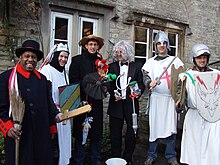Mummery
Mummenschanz , in New High German mostly masculine Mummenschanz , in Early New High German feminine the mumschanz , momschanz , also called Mummerei , is originally the name of a game of chance with dice , which, as part of masked parades , also played a role in the customs of Mardi Gras and Carnival . Century took on the meaning of "masquerade, masquerade".
etymology
The component -schanz goes back to the Middle High German word schanz (e) "Fall der Würfel, Würfelspiel", more generally also "Spiel, Wagnis", which in turn is borrowed from the old French ch (e) ance , "Fall", "lucky chance" , "happy case of the dice", and is still up in the phrase zuschanzen something someone "provide someone with an advantage of something good help" lives on.
The origin of the first component Mum (men) - on the other hand, is not entirely certain and is traced back to the Middle High German verb mummen or mumman , which was used in the 14th to 16th centuries to denote a game of chance and has been documented in this meaning since 1351 . On the other hand, it also comes from the word mumme “mask, disguised figure”, which has been documented in this meaning since 1475 and still lives on today in the prefixed forms of mumbling “masking, disguising” and muming up “ wrapping in warm clothes” and in turn from old French momer (documented since 1263) “dress up, mask” or momon “mask” and then in the last instance from Spanish and Portuguese momo “grimace, buffoon, mocking gesture”, or from an onomatopoeic mummer “incomprehensible speaking”.
The composition mumschanz or momschanz has been documented in German since the 16th century by expressions like a mumm (en) schanz, throw, bring , both as a general term for gambling with dice, as well as in connection with the custom, Visiting foreign households disguised with masks during Christian Lent or especially during the actual Mardi Gras and offering a game of dice there, which was widespread in Germany and France and in England also had late medieval forerunners.
If mumschanz was not a term for “dice game by mums, disguised persons” from the beginning due to its origin from mumme “mask, disguised person” and was only subsequently generalized to the meaning “dice game”, it is therefore a general term for “ Dice game ", which was only transferred to this custom through the inclusion in the custom and secondary association with mumme " mask, disguised person ". In the further development up to the 18th century, the reference to gambling and dice games was largely lost, so that the word has since remained common only in the meaning of "masquerade, mask game" (mostly with a derogatory connotation). In 1825, Goethe wrote a poem with the title Der Cölner Mummenschanz .
Customs
In the case of a wedding ceremony of higher classes associated with a mummery, the groom brought his bride a mummery, the price was usually a gem.
Web links
Individual evidence
- ↑ Matthias Lexer: Middle High German Concise Dictionary , reprint of the Leipzig edition 1872–1878, S. Hirzel, Stuttgart 1992, sv schanze, schanz stf. ( Online version )
- ↑ a b c Friedrich Kluge: Etymological dictionary of the German language , edit. by Elmar Seebold, 23rd, ext. Ed., Walter de Gruyter, Berlin / New York 1995, p. 574 sv Mummenschanz
- ↑ Lexer, Middle High German Concise Dictionary , sv mummen ( online version )
- ↑ Duden - The dictionary of origin , 4th, revised. Ed., Edited by Brigitte Alsleben, Bibliographisches Institut & FA Brockhaus, Mannheim 2007, p. 543 sv mummen
- ↑ a b Friedrich Ludwig Karl Weigand: German Dictionary , 4th Edition, Volume II, Gießen 1882, p. 151
- ^ Algirdas Julien Greimas: Dictionnaire de l'ancien français , nouvelle édition revue et corrigé, Larousse, Paris 1988, p. 421 sv momer
- ↑ Cf. Jacob Grimm / Wilhelm Grimm: German Dictionary , Volume 12, Sp. 2663, sv mummen ( online version )
- ↑ Jacob Grimm / Wilhelm Grimm: German Dictionary , Volume 12, Sp. 2664, sv Mummenschanz ( online version ( page no longer available , search in web archives ) Info: The link was automatically marked as defective. Please check the link according to the instructions and then remove this notice. )
- ↑ Christof Wilhelm Scherm: Englische Hofmaskeraden bis 1550, I. In: Studies on the comparative history of literature 8 (1908), pp. 406-427, pp. 408ff.
- ↑ Claudia Schnitzer: Courtly Masquerades: Function and equipment of clothing divertissements at German courts in the early modern period . Max Niemeyer Verlag, Tübingen 1999, p. 28, 234-237. Last accessed on January 3, 2019.

